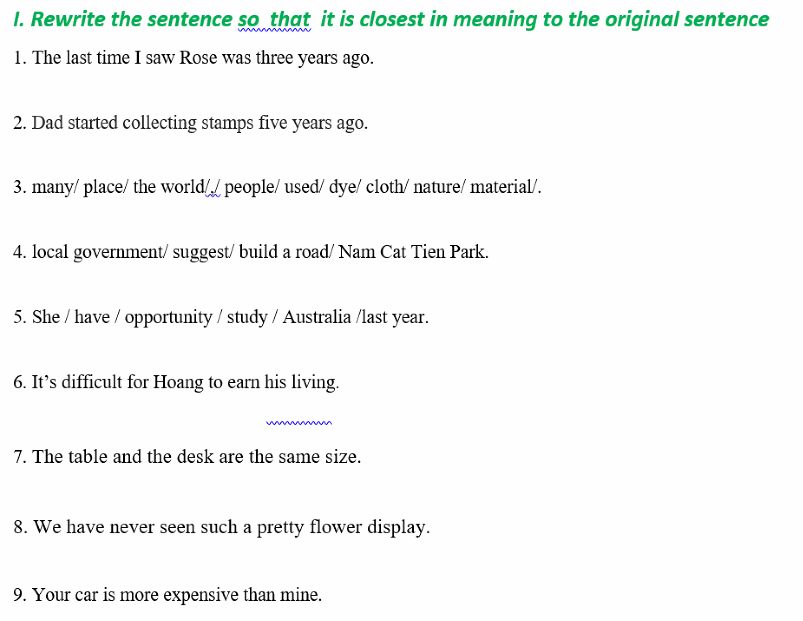
giúp em với ạ mấy bài này khó quá !!
Hãy nhập câu hỏi của bạn vào đây, nếu là tài khoản VIP, bạn sẽ được ưu tiên trả lời.


\(1,x:\left(-\dfrac{1}{3}\right)^3=\left(-\dfrac{1}{3}\right)\\ \Leftrightarrow x=\left(-\dfrac{1}{3}\right)\times\left(-\dfrac{1}{3}\right)^3\\ \Leftrightarrow x=\left(-\dfrac{1}{3}\right)^4=\dfrac{1}{81}\\ 2,\left(\dfrac{4}{5}\right)^5.x=\left(\dfrac{4}{5}\right)^7\\ \Leftrightarrow x=\left(\dfrac{4}{5}\right)^7:\left(\dfrac{4}{5}\right)^5=\left(\dfrac{4}{5}\right)^{7-5}=\left(\dfrac{4}{5}\right)^2=\dfrac{16}{25}\)
\(3,\left(x+\dfrac{1}{2}\right)^2=\dfrac{1}{16}\\ \Leftrightarrow\left[{}\begin{matrix}x+\dfrac{1}{2}=\dfrac{1}{4}\\x+\dfrac{1}{2}=-\dfrac{1}{4}\end{matrix}\right.\\ \Leftrightarrow\left[{}\begin{matrix}x=-\dfrac{1}{4}\\x=-\dfrac{3}{4}\end{matrix}\right.\)
\(4,\left(3x+1\right)^3=-27\\ \Leftrightarrow\left(3x+1\right)^3=\left(-3\right)^3\\ \Leftrightarrow3x+1=-3\\ \Leftrightarrow3x=-4\\ \Leftrightarrow x=-\dfrac{4}{3}\)
\(5,\left(\dfrac{1}{2}\right)^2.x=\left(\dfrac{1}{2}\right)^5\\ \Leftrightarrow x=\left(\dfrac{1}{2}\right)^5:\left(\dfrac{1}{2}\right)^2\\ \Leftrightarrow x=\left(\dfrac{1}{2}\right)^{5-2}=\left(\dfrac{1}{2}\right)^3=\dfrac{1}{8}\)
\(6,\left(-\dfrac{1}{3}\right)^3.x=\dfrac{1}{81}\\ \Leftrightarrow\left(-\dfrac{1}{3}\right)^3.x=\left(-\dfrac{1}{3}\right)^4\\ \Leftrightarrow x=\left(-\dfrac{1}{3}\right)^4:\left(-\dfrac{1}{3}\right)^3=-\dfrac{1}{3}\)
\(7,\left(2x-3\right)^2=16\\ \Leftrightarrow\left[{}\begin{matrix}2x-3=4\\2x-3=-4\end{matrix}\right.\\ \Leftrightarrow\left[{}\begin{matrix}x=\dfrac{7}{2}\\x=-\dfrac{1}{2}\end{matrix}\right.\)
\(8,\left(x-\dfrac{2}{3}\right)^3=\dfrac{1}{27}\\ \Leftrightarrow\left(x-\dfrac{2}{3}\right)^3=\left(\dfrac{1}{3}\right)^3\\ \Leftrightarrow x-\dfrac{2}{3}=\dfrac{1}{3}\\ \Leftrightarrow x=\dfrac{1}{3}+\dfrac{2}{3}=\dfrac{3}{3}=1\)
`@` `\text {Ans}`
`\downarrow`
(Vế 1)
`1.`
`x \div(-1/3)^3 =-1/3`
`=> x= (-1/3) \times (-1/3)^3`
`=> x= (-1/3)^4`
`2.`
`(4/5)^5 *x = (4/5)^7`
`=> x = (4/5)^7 \div (4/5)^5`
`=> x=(4/5)^2`
`3.`
`(x+1/2)^2 =1/16`
`=> (x+1/2)^2 = (+-1/4)^2`
`=>`\(\left[{}\begin{matrix}x+\dfrac{1}{2}=\dfrac{1}{4}\\x+\dfrac{1}{2}=-\dfrac{1}{4}\end{matrix}\right.\)
`=>`\(\left[{}\begin{matrix}x=\dfrac{1}{4}-\dfrac{1}{2}\\x=-\dfrac{1}{4}-\dfrac{1}{2}\end{matrix}\right.\)
`=>`\(\left[{}\begin{matrix}x=-\dfrac{1}{4}\\x=-\dfrac{3}{4}\end{matrix}\right.\)
`4.`
`(3x+1)^3 = -27`
`=> (3x+1)^3 = (-3)^3`
`=> 3x+1=-3`
`=> 3x=-3-1`
`=> 3x =-4`
`=> x=-4/3`
`5.`
`(1/2)^2*x=(1/2)^5`
`=> x=(1/2)^5 \div (1/2)^2`
`=> x=(1/2)^3`
`6.`
`(-1/3)^3*x=1/81`
`=> (-1/3)^3*x = (1/3)^4`
`=> x= (1/3)^4 \div (-1/3)^3`
`=> x=(-1/3)`
`7.`
`(2x-3)^2 = 16`
`=> (2x-3)^2 = (+-4)^2`
`=>`\(\left[{}\begin{matrix}2x-3=4\\2x-3=-4\end{matrix}\right.\)
`=>`\(\left[{}\begin{matrix}2x=7\\2x=-1\end{matrix}\right.\)
`=>`\(\left[{}\begin{matrix}x=\dfrac{7}{2}\\x=-\dfrac{1}{2}\end{matrix}\right.\)
`8.`
`(x-2/3)^3 = 1/27`
`=> (x-2/3)^3 = (1/3)^3`
`=> x-2/3=1/3`
`=> x=1/3 + 2/3`
`=> x=1`

x + y = x . y
⇒ x + y − x . y = 0
⇒ x ( 1 − y ) + y = 0
⇒ x ( 1 − y ) + ( y − 1 ) = −1
⇒ ( 1 − y ) ( x − 1 ) = −1
Ta có bảng sau :
| 1-y | 1 | -1 |
| x-1 | -1 | 1 |
| y | 0 | 2 |
| x | 0 | 2 |
Vậy (x;y) thuộc (0;0);(2;2)
\(x+y=xy\)\(\Leftrightarrow xy-x-y=0\)
\(\Leftrightarrow x\left(y-1\right)-\left(y-1\right)=1\)( cộng 2 vế với 1 )
\(\Leftrightarrow\left(x-1\right)\left(y-1\right)=1\)
Lập bảng giá trị ta có:
| \(x-1\) | \(-1\) | \(1\) |
| \(x\) | \(0\) | \(2\) |
| \(y-1\) | \(-1\) | \(1\) |
| \(y\) | \(0\) | \(2\) |
Vậy \(x=y=0\)hoặc \(x=y=2\)

a: Ta có: \(2\sqrt{28}+3\sqrt{63}-3\sqrt{\dfrac{112}{9}}-\sqrt{\dfrac{196}{7}}\)
\(=4\sqrt{7}+9\sqrt{7}-4\sqrt{7}-2\sqrt{7}\)
\(=7\sqrt{7}\)
b: Ta có: \(\sqrt{8+2\sqrt{7}}-\sqrt{12-\sqrt{140}}-\sqrt{5}\)
\(=\sqrt{7}+1-\sqrt{7}+\sqrt{5}-\sqrt{5}\)
=1


Bài 1:
Ta có: \(A=\dfrac{x}{yz}:\dfrac{y}{zx}=\dfrac{x}{yz}.\dfrac{zx}{y}=\dfrac{x^2}{y^2}=\left(\dfrac{x}{y}\right)^2\)
Mà \(3x=2y\Leftrightarrow\dfrac{x}{y}=\dfrac{2}{3}\Leftrightarrow\left(\dfrac{x}{y}\right)^2=\dfrac{4}{9}\)
\(\Rightarrow A=\dfrac{4}{9}\)
\(1,\\ 3x=2y\Rightarrow\dfrac{x}{y}=\dfrac{2}{3}\Rightarrow\dfrac{x}{yz}=\dfrac{2}{3z}\\ 3x=2y\Rightarrow\dfrac{y}{x}=\dfrac{3}{2}\Rightarrow\dfrac{y}{zx}=\dfrac{3}{2z}\)
\(2,\\ \dfrac{x}{y^2}=2\Rightarrow x=2y^2\\ \dfrac{x}{y}=16\Rightarrow x=16y\\ \Rightarrow2y^2=16y\Rightarrow2y\left(y-8\right)=0\\ \Rightarrow\left[{}\begin{matrix}y=0\left(ktm.vì.y\ne0\right)\\y=8\end{matrix}\right.\Rightarrow y=8\Rightarrow x=128\)
\(3,\\ \dfrac{a}{b}=\dfrac{c}{d}\Rightarrow\dfrac{a}{c}=\dfrac{b}{d}=\dfrac{a-b}{c-d}\Rightarrow\dfrac{a-b}{b}=\dfrac{c-d}{d}\)

Dạng 4: Toán lượng dư:
Bài 1:nBr2=0,05x0,5=0,025 (mol)
PTHH: 2NaI+Br2→2NaBr+I2
0,025 0,05 (mol)
→ mNaBr=0,05.103= 5,15 (g)
Chúc em học giỏi
Mk biết nhưng mk ngại viết lắm. Sorry nha